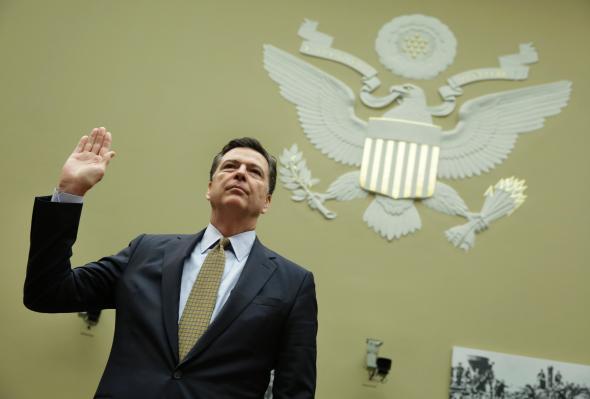On Jan. 27th, a week after the inauguration, President Trump had dinner with embattled FBI Director James Comey. This we know. Trump told NBC News’ Lester Holt the two met for dinner at the White House. On Thursday, the New York Times gave more insight into that dinner meeting, citing two sources close to Comey, almost all of which the White House denies.
The Times’ reporting paints a picture of the new president probing the FBI director to gauge his “loyalty.” Obama appointed Comey to head the FBI in Sept. 2013, beginning what was meant to be a 10-year term. According to the Times, the first time Comey had met Trump was during the transition when he was given the delicate task of briefing the president-elect on the details of an explosive, unverified dossier compiled by former British intelligence operative, Christopher Steele, which included allegations ranging from collusion to “perverted sex acts.” A month after that encounter, Comey and Trump sat down to dinner at the White Hosue.
From the Times:
As they ate, the president and Mr. Comey made small talk about the election and the crowd sizes at Mr. Trump’s rallies. The president then turned the conversation to whether Mr. Comey would pledge his loyalty to him. Mr. Comey declined to make that pledge. Instead, Mr. Comey has recounted to others, he told Mr. Trump that he would always be honest with him, but that he was not “reliable” in the conventional political sense… By Mr. Comey’s account, his answer to Mr. Trump’s initial question apparently did not satisfy the president, the associates said. Later in the dinner, Mr. Trump again said to Mr. Comey that he needed his loyalty… Mr. Comey’s associates said that the new president requested the dinner he described, and said that he was wary about attending because he did not want to appear too chummy with Mr. Trump, especially amid the Russia investigation. But Mr. Comey went because he did not believe he could turn down a meeting with the new president.
The White House, which has struggled to get its story straight on the motive and reasoning for Comey’s dismissal, disputed that account of the evening. “We don’t believe this to be an accurate account,” said Sarah Huckabee Sanders, the deputy press secretary, told the Times.. “[The president] would never even suggest the expectation of personal loyalty, only loyalty to our country and its great people.”
During his sit-down with NBC News, Trump was vague about the origins and intentions of the meeting.
HOLT: Let me ask you about your termination letter to Mr. Comey. You write “I greatly appreciate you informing me on three separate occasions that I am not under investigation.” Why did you put that in there?
TRUMP: Because he told me that. I mean he told me it.
HOLT: He told you weren’t under investigation [OVER TALK] regardless—
TRUMP: Yea and I’ve–I’ve heard that from others I think-
HOLT: Was it in a phone call, did you meet face to face?
TRUMP: I had a dinner with [Comey]. He wanted to have dinner because he wanted to stay on. We had a very nice dinner at the White House
HOLT: He asked for the dinner?
TRUMP: A dinner was arranged, I think he asked for the dinner. And he wanted to stay on as the FBI head. And I said I’ll you know consider and we’ll see what happens. But we had a very nice dinner. And at that time he told me you are not under investigation.
It’s important to remember that at this time the FBI was already investigating Russia’s election meddling and Russian ties to Trump and his associates. That makes the context in which Trump queried Comey on his loyalty inextricable from the Russia investigation. This also lends increasing importance to the timeline of when Trump decided he wanted Comey gone. After initially pinning responsibility for Comey’s firing on others, Trump told Holt he was going to do it anyway, with or without the recommendation of his Justice Department. The timeframe also shifted, instead of being a recent development, White House spokeswoman Sarah Huckabee Sanders said on Wednesday the president had lost confidence in Comey “over the last several months.”
The last several months, you say? Once the White House stops lying, the timeframe of Trump’s decision will be increasingly important in determining whether he obstructed justice.
